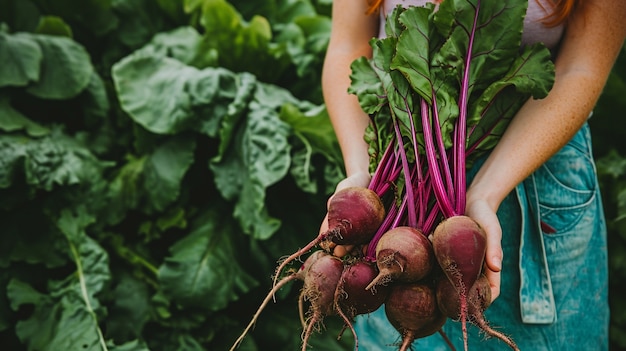What Are Beets?
Beets come from the roots of beetroot plants (Beta vulgaris). Every part of the plant is edible, and many people enjoy young beet greens in salads. While most Americans think of the richly colored red beet, there are many other varieties, including sugar beets and golden beets, each with its own unique culinary profile.
What Vitamins & Minerals Do Beets Have?
No matter which type of beet you choose, it will be packed with health-promoting compounds and phytonutrients. Beets are rich in immune-boosting vitamins like vitamin C and essential minerals such as potassium, manganese, and iron. They are also a great source of lysine, an essential amino acid that your body cannot produce on its own. Beets support overall wellness by providing a delicious serving of fiber and antioxidants with every bite.
Here is the nutritional breakdown for one cup of raw beets according to the United States Department of Agriculture’s (USDA) National Nutrient Database:
Nutrient Amount In 1 Cup of Beets
Protein: 2.2 g
Fiber: 3.8 g
Sugars: 9.19 g
Calcium: 22 mg
Iron: 1.09 mg
Magnesium: 31 mg
Phosphorus: 54 mg
Potassium: 442 mg
Sodium: 106 mg
Zinc: 0.48 mg
Copper: 0.102 mg
Manganese: 0.447 mg
Selenium: 1.0 μg
Vitamin C: 6.7 mg
Thiamin: 0.042 mg
Riboflavin: 0.054 mg
Niacin: 0.454 mg
Folate: 148 μg
Betaine: 175 mg
Vitamin A: 3 μg
Vitamin K: 0.3 μg
The Top Health Benefits of Beets
Beets are one of the oldest known vegetables, used by humans for various health concerns since ancient times. While they remain a staple in some diets, their health benefits are not as widely recognized today. However, modern research suggests that beets have incredible health benefits. Here are some of the most recent, verifiable ways beets can support your health:
Great Source of Antioxidants
Beets, like many other fruits and vegetables, are full of antioxidants. These compounds help promote good health for many of your organs, including your heart, by protecting against free radical damage at a cellular level. Free radicals are at the root of many health concerns, including some types of cancer. Frequently eating foods rich in antioxidants, like beets, will provide your body with the antioxidants it needs to promote sustained wellness. They can even act as anti-inflammatories to help protect against some forms of light inflammation.
Supports Cardiovascular Health
Beets contain naturally occurring nitrates, which convert into nitric oxide in your blood and can help promote cardiovascular health. Nitric oxide can widen blood vessels, increasing oxygen efficiency to the heart and other vital organs. Some of these effects are almost immediate. Drinking beet juice, for example, seems to lower blood pressure, both systolic and diastolic, within 24 hours of consumption. Beets also contain fiber and betaine, both of which support a healthy heart. Fiber helps promote healthy cholesterol levels, while betaine can reduce homocysteine, an amino acid in the blood that has been shown to contribute to heart disease.
Boosts Exercise & Performance
The same nitrates that benefit your heart also enhance your endurance, stamina, and muscle health. As nitrates increase blood flow, they can help athletes improve their performance and increase their stamina, providing longer-lasting energy for competition day. Similarly, beets can help athletes with muscle strength and recovery, again due to increased blood flow and oxygen efficiency.
Encourages Brain Health
Beets promote a healthy mind and mood. While those nitrates are stimulating blood flow to your heart and lungs, your brain also gets more blood, helping your mind feel more focused and clear. Fresh beets contain brain-supporting compounds, including antioxidants, magnesium, vitamin C, and betaine. One animal study found that mice experienced reduced stress and anxiety when given beetroot leaf extracts.
Promotes Strong Bones
Beets are filled with nutrients that help build strong, healthy bones. These nutrients include bone-supporting minerals like copper, folate, and magnesium. Beets also contain silica, a mineral that promotes healthy levels of calcium absorption in your body.
Stimulates Detoxification
Beets are one of the best vegetables for supporting your body’s natural detox mechanisms. The pigment that gives beets their unique coloring, betalain, also helps expel toxins from the body. Betalains work with your body’s natural defense mechanisms to help bind and eliminate toxins.
Vitalizes Liver & Kidney Health
These natural betalain compounds also help promote liver and kidney health, the two primary detoxifying organs in the body. Betanins, a type of betalain compound found in beets, help create enzymes that promote detoxification and antioxidant activity inside your liver. On a side note, beet juice and beet soup are two of my favorite liver cleansing foods.
Supports Digestive Health
Beets are high in fiber and vitamin B-9. Together, these compounds help promote proper digestion. Fiber helps with healthy bowel movements and prevents constipation. It’s also an excellent prebiotic, feeding healthy probiotic bacteria in your gut. Vitamin B-9, or folate, is an essential vitamin that promotes a healthy colon and gastrointestinal health. Consuming beets allows these two forces to work together, helping maintain a healthy metabolism and digestive system. Beets also have betaine hydrochloride, an organic compound that helps the stomach break down fat and proteins in your food, making it a powerful digestive aid.
Adding Beets to Your Diet
While pickled or canned beets are common, there are many better ways to add beets to your daily diet. Fresh beets can be a great addition to many drinks and salads. For a delicious beet juice, juice the following ingredients (if you don’t have a juicer, blend them with 1 or 2 cups of water):
Beet Juice Ingredients:
3 Organic carrots (peeled and washed)
1 Organic beet (peeled and washed)
2 Organic red apples (washed and cut)
6 Organic kale leaves
? Inch of ginger root
? Organic lemon, peeled
While there are countless beet salad recipes out there, this goji berry wild rice salad with beets is one of my absolute favorites. If eating or drinking beets isn’t for you, beet extracts and powders are becoming more common. Because beets are increasingly popular among athletes, you can now easily find beet supplements that contain nitric oxides and other compounds derived from beets to promote endurance and physical performance.
Beet Side Effects & Precautions
While there are no serious health concerns when it comes to eating beets, they do have one unique property that could cause a false alarm. The pigments that give red beets their unusual color can give your stool a reddish-purple tint. If this happens to you, don’t be alarmed. While some people mistake this red coloring for blood in their stool, it’s not. This temporary change in coloring is harmless and should go away completely after one or two bowel movements.
And the Beet Goes On
Beets are great for your health, and I always recommend adding them to your regular diet for the way they support the liver and kidneys. However, if you are looking to cleanse your liver of toxic buildup completely, beets should be part of a larger solution. Performing a regular liver cleanse does far more than beets could do on their own. Regular liver cleansing can improve how your entire body looks and feels. As toxins get pushed out, your body can better absorb the good stuff.
One essential part of my recommended liver cleanse includes a powerful liver cleanse soup, with beets as one of the main ingredients. For this recipe and more liver cleansing tips, check out my Liver Cleanse Program.



